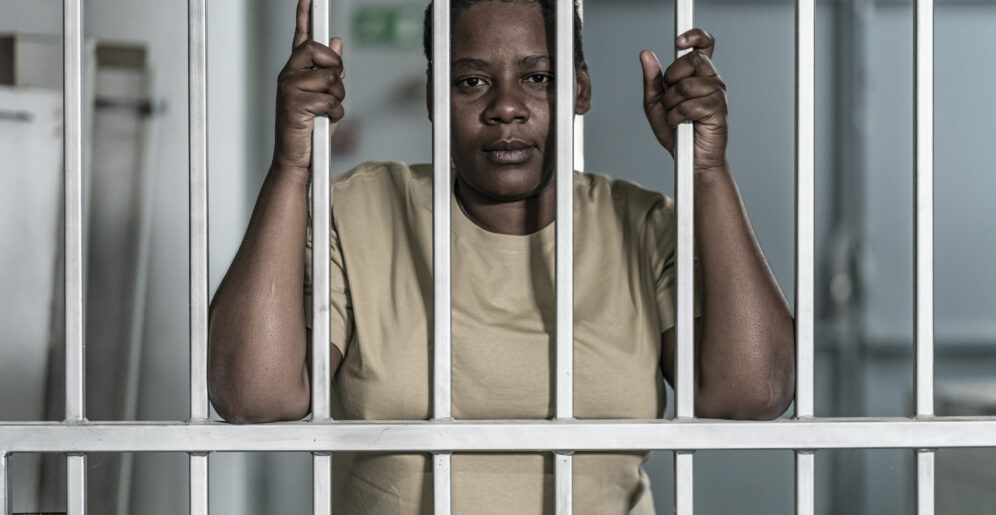
Activism
Honoring Black Mothers Behind Bars During Black August
There’s been a lot of talk about “blue jeans” (or “genes”) lately, but blue jeans weren’t always about fashion. Once known as “prison blues,” they were the standard uniforms worn by people serving time, not strutting down runways. This month, as we observe Black August, a month to honor liberation movements rooted in resistance against mass incarceration, we want to focus attention on an urgent, often overlooked reality: the prison system and the mothers most impacted by it. Originating in California prisons during the 1970s, Black August commemorates the strength and resilience of incarcerated people, and this year, we’re shining a light on women behind bars who are mothers.
In the United States, the number of incarcerated women has skyrocketed by more than 500% over the past 40 years, and some of these women are expecting mothers. Incarcerated pregnant women face harsh conditions (from limited prenatal care to separation from their newborns shortly after birth) which adds layers of trauma to an already difficult situation. The consequences ripple far beyond prison walls, affecting families, children, and communities left behind. Organizations like ours- Nurturing Wāhine Fund (NWF) in Hawai‘i and Pregnant and Black (PAB)- are rising to meet this crisis, advocating for the rights and resources every mother deserves. NWF is currently funding SweetGrass Wellness Collective, a dedicated group of Black midwives and doulas passionate about expanding their support into prisons and restoring culturally grounded maternal care. Also, this month, NWF is partnering with KHopeacetic, a digital communications and marketing firm, and In The Vā, a collective rooted in sovereignty through storytelling, to host a book-club-style gathering centered on Liberty, the creative writing newsletter by women at the Women’s Community Correctional Center, Hawaiʻi’s all-women prison. People attending the events will reflect, write, and share responses back to the women at WCCC as an act of solidarity. One of the featured pieces in Liberty is Wonder by author Shari Kamaka, who writes: “Once upon a time there was a Princess from far, far away. She was cursed by crystal meth that turned her into an ugly ogre. She was then captured by HPD and sent to a dungeon for a long, long time. The only way the curse can be broken is by true self love.”
Everyone deserves to tell their stories.
The ladies at WCCC were thrilled NWF invited Kemba Smith to speak to them last year. Kemba is an African American woman who became widely known in the 1990s after receiving a 24.5-year federal prison sentence for a first-time, nonviolent drug offense connected to her abusive boyfriend. Kemba found herself seven months pregnant in jail. Her journey reminds us why we must demand justice, compassion, and support for incarcerated mothers.
The U.S. incarcerates women at the world’s highest rate. According to the U.S. Government Accountability Office, women make up 15% of the local jail population, and at the time of incarceration, 4% to 5% of women reported being pregnant. Comprehensive data on these women, including race or ethnicity, doesn’t exist. That’s a problem. Without comprehensive data that includes race and ethnicity, we miss how overlapping systems of oppression uniquely impact incarcerated pregnant women of color. Intersectionality shows us that Black, Indigenous, and other women of color face compounded challenges, not just from incarceration, but also from racism, sexism, and economic inequality. When data fails to capture these layers, policies and support programs risk overlooking the specific needs and experiences of these women, perpetuating disparities and injustice rather than addressing them.
“Black mothers are already ‘handcuffed’ when it comes to maternal health and the evidence is clear: systemic bias and racism fuel disparities that put our lives at risk and cause higher incidences of maternal mortality. For mothers behind bars, those shackles are even heavier,” says Rayna Reid Rayford, founder of Pregnant and Black.
About 40 states have passed laws limiting the use of restraints (e.g.,handcuffs) on pregnant people in law enforcement custody, according to a Johns Hopkins University research group. Laws that aim to improve treatment of pregnant women in jails and prisons have drawn bipartisan support, including the First Step Act, which was passed in 2018 and limits the use of restraints on pregnant people in federal custody. However, unfortunately, advocates say they continue logging reports of law enforcement agencies and hospital staffers ignoring this and allowing pregnant people to be chained, handcuffed, or restrained. To truly engage in reflection during Black August means demanding better visibility, care, and justice for Black mothers behind bars whose stories are too often erased.
Pregnant and Black is a digital platform and upcoming mobile app designed to support Black expectant mothers by connecting them with culturally competent healthcare advocates, vital resources, and a supportive community during pregnancy. “We cannot fight for justice in the maternal health space without including incarcerated Black women in the conversation and birth equity will not be complete until we acknowledge the struggles pregnant incarcerated women of color are forced to endure.”
As we honor Black August, we are reminded that real liberation includes the voices of those too often ignored. By listening, reflecting, and acting alongside incarcerated mothers, we can begin to repair a system that has failed them. We invite readers to join us in advocating for policies, programs, and community care that center these women, because birth justice is inseparable from racial and social justice.
Get The Latest
Signup for the AFROPUNK newsletter